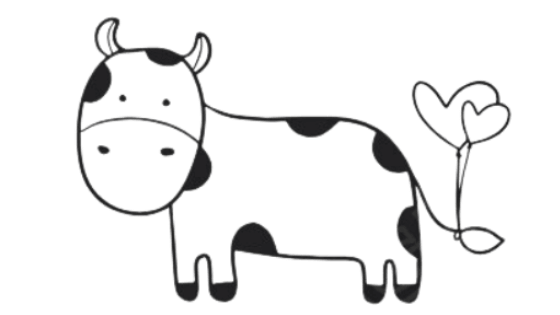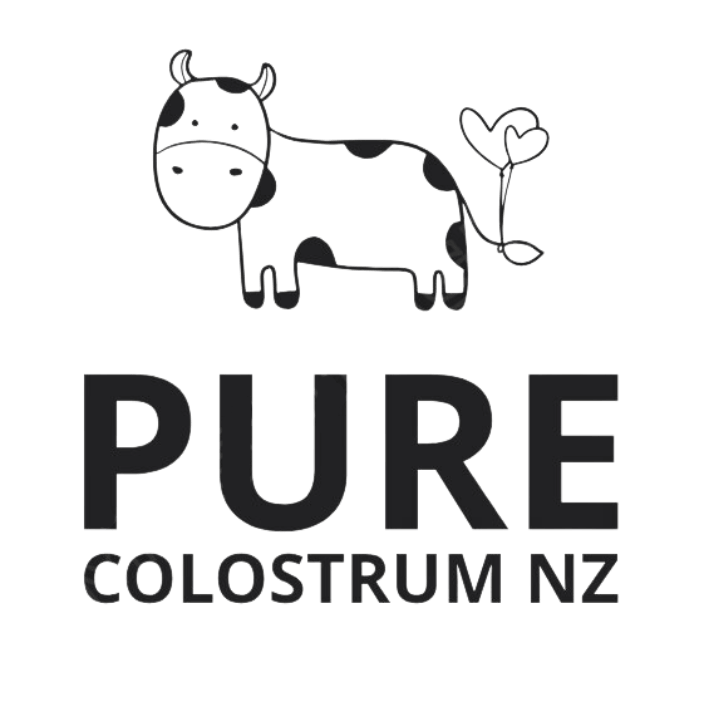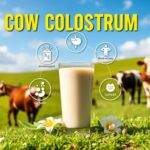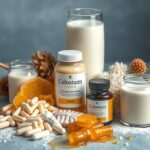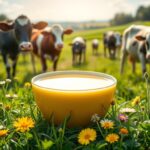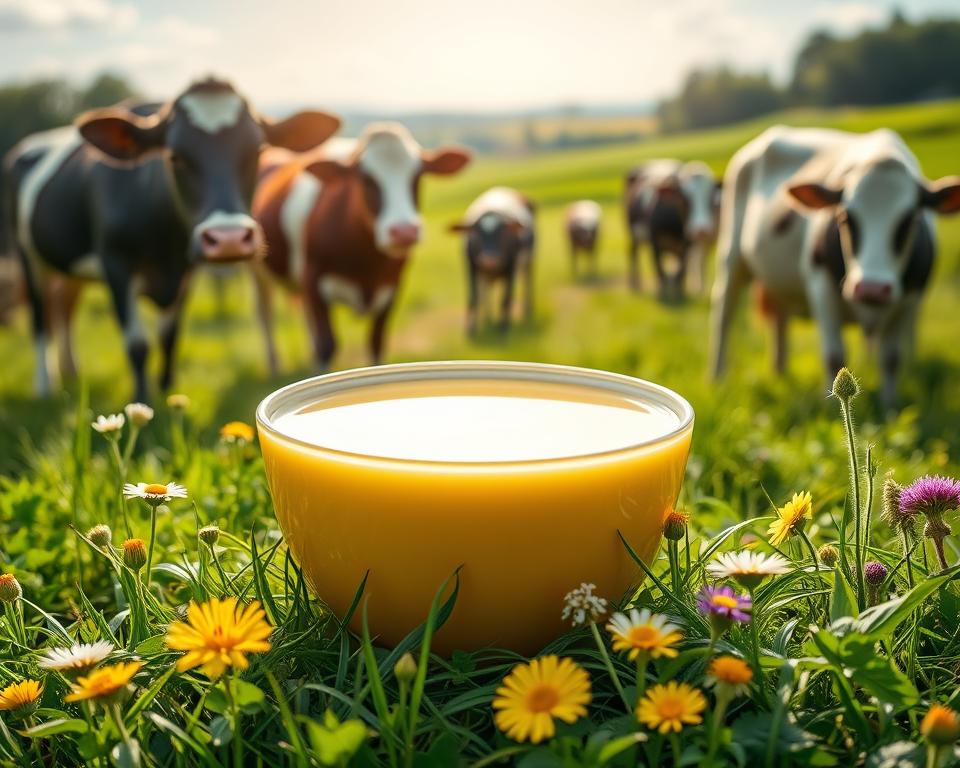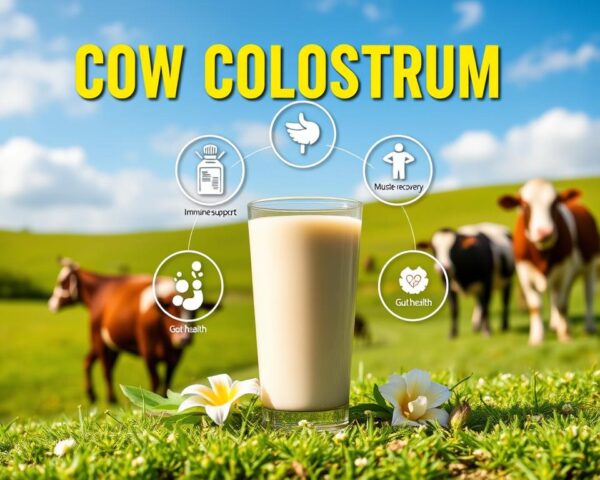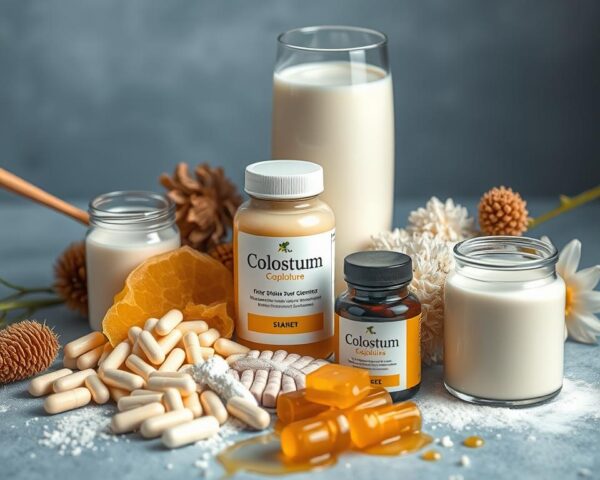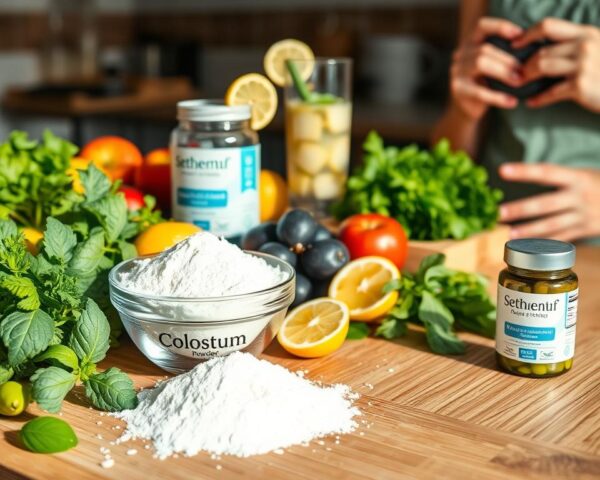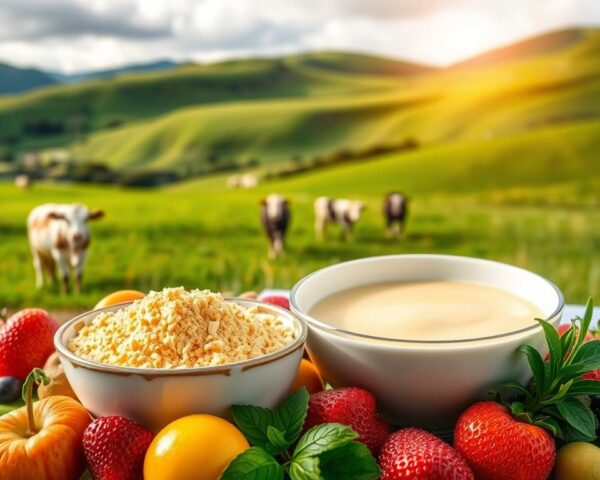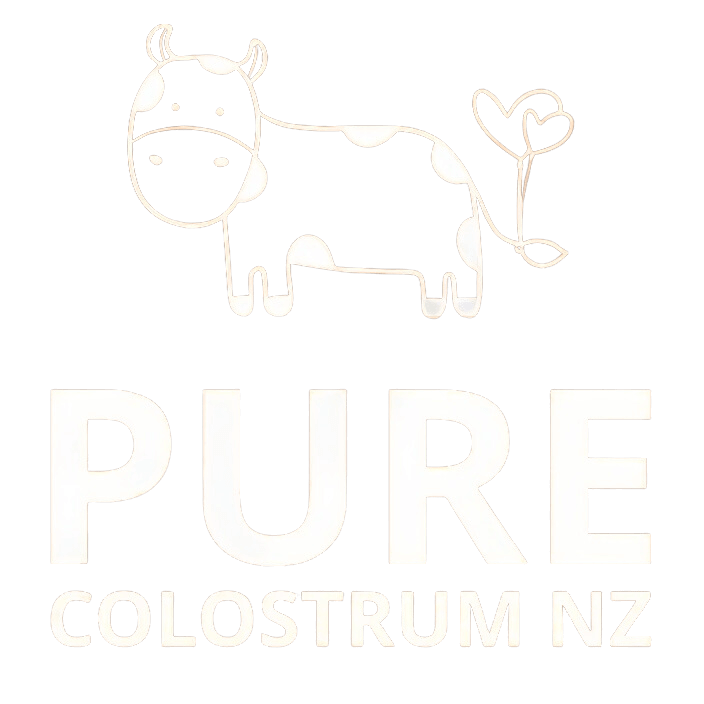Everything You Need to Know About Bovine Colostrum
Bovine colostrum, commonly known as cow’s first milk, has emerged as a significant immune-boosting supplement. Produced by cows immediately post-partum, it is rich in nutrients and offers substantial health benefits for humans. Delving into the colostrum benefits reveals its unique composition and impressive properties.
This substance is loaded with essential nutrients, antibodies, and growth factors, aiding not just newborn calves but also humans. Its protein content surpasses that of mature cow’s milk, positioning it as a crucial nutritional source. Further exploration in this article unveils the myriad ways bovine colostrum can enhance your health.
Its potential extends from boosting immune function to aiding gastrointestinal health. Recent studies hint at its role in athletic performance and as a potential cancer treatment adjunct. This guide offers insights into its production, safety, and ongoing research, highlighting its status as a remarkable natural supplement.
Key Takeaways
- Bovine colostrum is a nutrient-dense first milk produced by cows after birth
- It contains higher concentrations of proteins, antibodies, and growth factors than mature milk
- Colostrum benefits include immune system support and gastrointestinal health improvement
- Research suggests potential applications in athletic performance enhancement
- Ongoing studies explore its use in cancer treatment and antiviral therapies
What is Bovine Colostrum?
Bovine colostrum, commonly known as cow’s first milk, is a vital fluid produced by cows immediately after birth. This golden fluid is essential for the nourishment and protection of newborn calves. It’s crucial to understand the definition and composition of colostrum to appreciate its health benefits for humans.
Definition and Origin
Bovine colostrum emerges as the initial secretion from a cow’s mammary glands post-calving. It is available for a brief period, spanning from 24 to 72 hours after birth. This specialized milk is loaded with nutrients and immune-boosting elements, aimed at providing newborn calves with a robust start in life.
Composition of Bovine Colostrum
The composition of colostrum diverges significantly from regular milk. It is abundant in proteins, antibodies, growth factors, and bioactive compounds. Bovine colostrum boasts higher vitamin and mineral concentrations than mature milk. Its immunoglobulin content is particularly high, aiding in immune system fortification.
Differences from Mature Milk
Several distinct differences arise when comparing bovine colostrum to mature milk:
- Protein content: Colostrum contains about 15% protein, while mature milk has only 3%.
- Immunoglobulins: These are abundant in colostrum but scarce in mature milk.
- Growth factors: Colostrum is rich in growth-promoting substances absent in mature milk.
- Fat content: Colostrum typically has less fat than mature milk.
These differences underscore why bovine colostrum is being explored as a potential health supplement for humans. Its unique composition suggests a broad array of potential benefits, from immune system support to gut health enhancement.
The Nutritional Profile of Bovine Colostrum
Bovine colostrum nutrition is a treasure trove of essential nutrients, providing a unique blend crucial for optimal health. Produced by cows immediately after birth, it is richer in vital substances than regular milk. This first milk is a powerhouse for health.
Proteins and Peptides
The protein content in bovine colostrum is exceptionally high, at 140 mg/mL, far surpassing the 36 mg/mL found in mature milk. It boasts significant amounts of casein (43 mg/mL) and whey (120 mg/mL). These proteins are essential for immune function and overall health support.
Carbohydrates and Oligosaccharides
Colostrum has a lower lactose content (27 mg/mL) than mature milk (49 mg/mL), yet it is rich in beneficial oligosaccharides. These complex carbohydrates function as prebiotics, aiding gut health and boosting the immune system.
Fats and Lipids
Colostrum contains more fats (64 mg/mL) than mature milk (39 mg/mL), including beneficial oleic acid. These fats are crucial for cardiovascular health and provide essential energy for newborns.
Vitamins and Minerals
Colostrum is replete with vitamins A (4.90 mg/kg) and E (77.17 mg/kg of fat), offering higher concentrations than mature milk. It is also rich in minerals like calcium, phosphorus, and zinc, vital for various bodily functions.

| Nutrient | Bovine Colostrum | Mature Milk |
|---|---|---|
| Total Protein | 140 mg/mL | 36 mg/mL |
| Fat | 64 mg/mL | 39 mg/mL |
| Lactose | 27 mg/mL | 49 mg/mL |
| IgG | 55 mg/mL | 0.26 mg/mL |
This nutrient-dense composition positions bovine colostrum as a valuable dietary supplement. It offers potential benefits for immune support, gut health, and overall wellbeing.
Bovine Colostrum Production and Processing
Bovine colostrum production is vital in dairy farming. Dairy cows produce this vital substance in the initial 24-48 hours post-calving. Notably, colostrum represents a mere 0.5% of a cow’s annual milk yield.
The colostrum collection process starts with meticulous selection from healthy cows. Farmers reserve 5-10 litres for the calf, while the surplus is collected. Holstein-Friesian cows from Denmark are frequently utilised, ensuring a consistent quality.

Processing colostrum involves several critical steps to safeguard its bioactive elements. Following collection, the colostrum undergoes rigorous quality assessments for cleanliness and microbial contamination. Subsequently, it is frozen to lock in its properties.
The subsequent phase includes thawing, pasteurisation, and low-temperature spray drying. This approach ensures the colostrum’s bioactivity is maintained. The outcome is a powder, primarily used in colostrum supplements.
Ensuring quality is the cornerstone of colostrum production. Producers meticulously test for solubility, microbial load, and immunoglobulin G (IgG) content. These protocols guarantee that the colostrum supplements adhere to stringent food safety standards and retain their nutritional efficacy.
Interestingly, IgG levels differ across cattle breeds. Jerseys boast the highest at 66.5 g/L, whereas Friesian-Holstein cows average 41.2 g/L. The cow’s age, calving season, and dry period duration significantly influence colostrum quality.
Health Benefits and Potential Uses
Bovine colostrum is a treasure trove of health benefits, supporting your overall well-being. It’s loaded with essential nutrients that enhance various bodily functions.
Immune System Support
Colostrum is vital for immune health. Studies reveal that preschoolers taking bovine colostrum for 45 days boosted their immunity and cut down on respiratory infections over 20 weeks. Adults can also gain from it, with doses between 10g to 60g daily potentially lowering upper respiratory infections.
Gastrointestinal Health
For gut health, bovine colostrum is a game-changer. It effectively reduces stool frequency and detects bacteria/virus in children with diarrhoea from rotavirus and E. coli. Its ability to modulate the immune system hints at benefits for inflammatory bowel disease and other digestive issues.
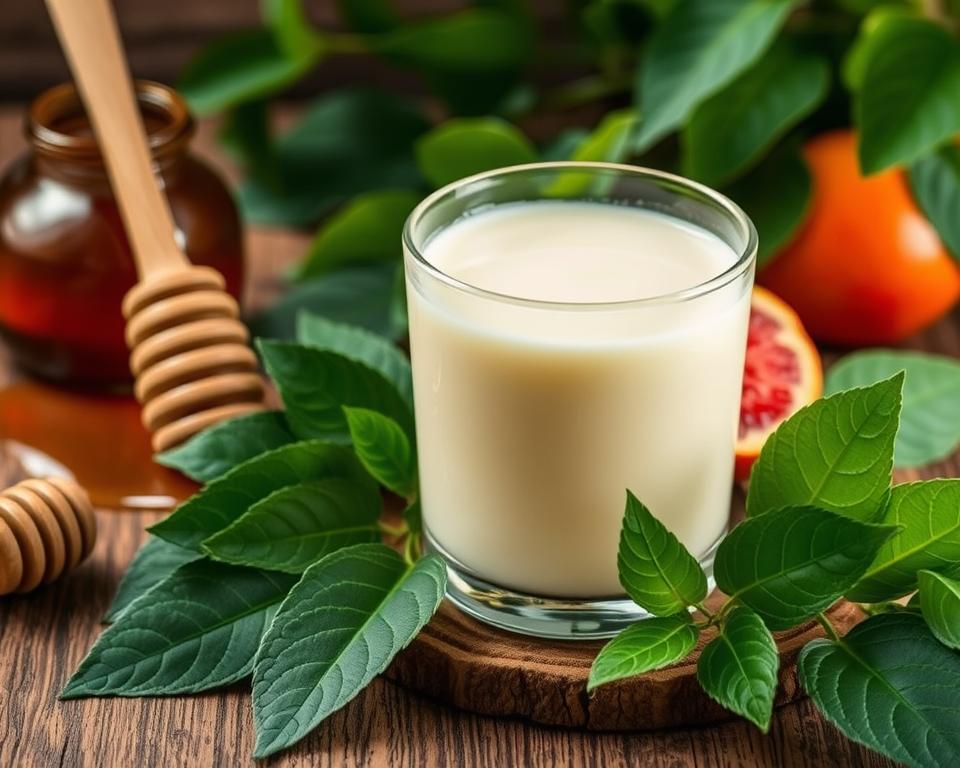
Athletic Performance
For athletes, bovine colostrum supplementation could be a game-changer. It enhances gut permeability, ensuring better nutrient uptake and less inflammation after exercise. This could lead to faster recovery and improved performance.
Potential Cancer Treatment
Though still in its early stages, research hints at bovine colostrum’s anti-cancer potential. Its high bioactive protein and growth factor content might aid in cancer research. However, more studies are needed to fully grasp its role in this field.
| Benefit | Evidence |
|---|---|
| Immune Support | 45-day supplementation reduced upper respiratory infections in children |
| Gut Health | Effective against infectious diarrhoea in children |
| Athletic Performance | Improves gut permeability and reduces inflammation in athletes |
| Cancer Research | Potential anti-cancer effects, further studies needed |
Safety and Considerations
Bovine colostrum safety is paramount when considering this supplement. It is generally deemed safe, yet understanding potential side effects and contraindications is vital.
Possible Side Effects
Some individuals might encounter side effects from colostrum supplements. These can encompass digestive discomfort, nausea, or allergic reactions, particularly for those with dairy sensitivities. It is crucial to observe your body’s reaction and consult a healthcare professional if adverse effects are noted.
Contraindications
Not everyone is suitable for colostrum supplements. Vegans and individuals with certain medical conditions should steer clear of these products. Those with a dairy allergy or on specific medications should consult a medical professional before initiating colostrum supplementation.
Dosage and Administration
The dosage of colostrum varies with its intended use. Standard recommendations span from 20 to 60 grams daily. Typically, it is administered orally in powder or capsule form. Adhering to the manufacturer’s guidelines or your healthcare provider’s advice is essential for optimal outcomes.
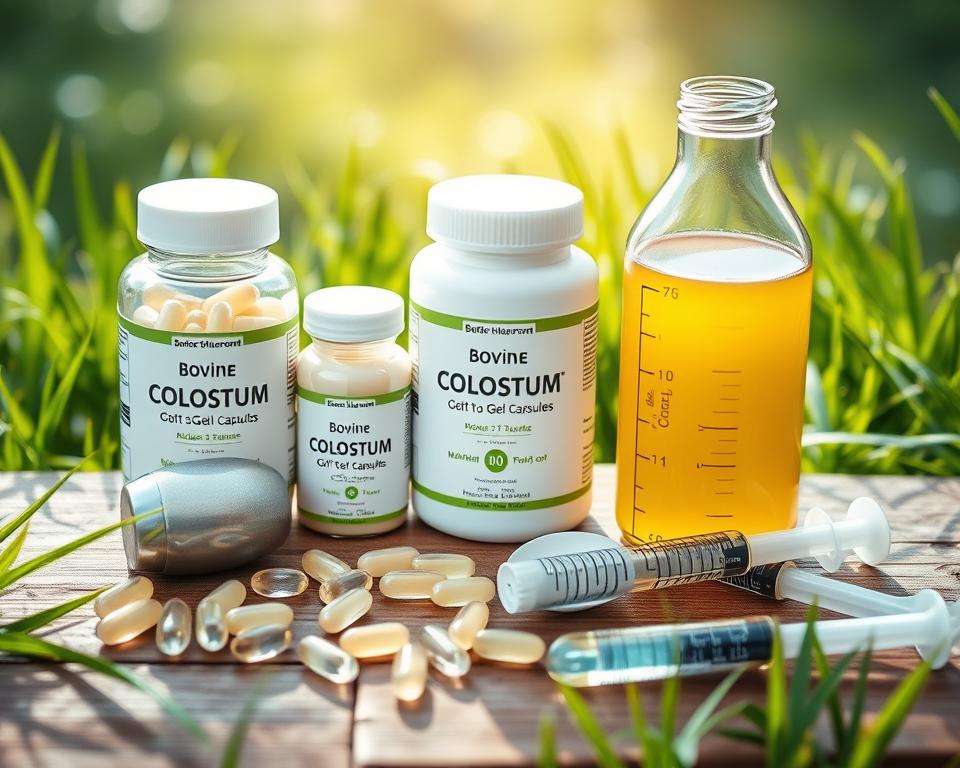
| Aspect | Details |
|---|---|
| Price Range | £40 to £80 per 450 grams |
| Typical Dosage | 10-25 grams per day for athletes |
| Quality Concerns | 60% of US colostrum fails minimum criteria |
| Potential Benefits | Gut health improvement, reduced inflammation |
Studies suggest colostrum supplements may benefit gut health and immune function. Yet, it is crucial to opt for high-quality products, as colostrum composition and quality can vary significantly across farms. Always prioritise safety and consult a healthcare professional before commencing any new supplement regimen.
Bovine Colostrum in Research and Development
Colostrum research has surged, with numerous clinical trials exploring its potential. Scientists are uncovering bovine colostrum’s unique properties for human health. This surge highlights its promising applications.
Recent studies indicate bovine colostrum has higher protein and lower lactose than mature milk. This makes it a potential solution for those with lactose intolerance. It opens new doors for colostrum development.
Research into colostrum has shown its benefits for the gut, immunity, and muscle repair. These findings have sparked interest in its future applications. Sports nutrition and recovery are areas of particular interest.
Clinical trials are examining bovine colostrum for treating various conditions. Its potential in immune support has been highlighted during the COVID-19 pandemic. Researchers are looking into its role in boosting immunity.
| Research Area | Potential Benefits |
|---|---|
| Gastrointestinal Health | Improved gut function, enhanced nutrient absorption |
| Immune Support | Increased resistance to infections, potential antimicrobial properties |
| Sports Nutrition | Enhanced muscle repair, improved recovery times |
| Lactose Intolerance | Alternative protein source for sensitive individuals |
As colostrum development advances, researchers are exploring new processing methods. They aim to create various products like dried forms and pills. These innovations aim to broaden access to bovine colostrum’s benefits.
Conclusion
Bovine colostrum stands out as a promising supplement, offering a broad spectrum of health benefits. It supports the immune system, enhances gut health, and boosts athletic performance. Its composition of proteins, antibodies, and growth factors makes it an intriguing subject for ongoing research.
It’s essential to understand that not all bovine colostrum is of equal quality. Only 39% of the colostrum collected in the United States meets the necessary standards for immunoglobulin levels and microbiological parameters. This underscores the need for selecting high-quality sources when considering colostrum supplements.
Looking ahead, bovine colostrum holds significant promise across various areas. Research suggests it could improve gut microbiota diversity in preterm infants and lower the risk of necrotising enterocolitis. Its antiviral properties, especially lactoferrin, are being explored for combating viruses like SARS-CoV-2. Always consult healthcare professionals before adding bovine colostrum to your diet to ensure it meets your health needs.
FAQ
What is bovine colostrum?
How does bovine colostrum differ from mature milk?
What is the nutritional profile of bovine colostrum?
How is bovine colostrum produced and processed?
What are the potential health benefits of bovine colostrum?
Are there any safety concerns or side effects associated with bovine colostrum?
How is bovine colostrum used as a supplement?
What areas of research are currently exploring bovine colostrum?
Source Links
- What to Know About Bovine Colostrum – https://www.webmd.com/vitamins-and-supplements/what-to-know-about-bovine-colostrum
- BOVINE COLOSTRUM: Overview, Uses, Side Effects, Precautions, Interactions, Dosing and Reviews – https://www.webmd.com/vitamins/ai/ingredientmono-785/bovine-colostrum
- Bovine Colostrum: Its Constituents and Uses – https://www.ncbi.nlm.nih.gov/pmc/articles/PMC7831509/
- What Is Colostrum? Nutrition, Benefits, and Downsides – https://www.healthline.com/nutrition/bovine-colostrum
- Bovine colostrum is going viral for its benefits for digestion, skin and more. Does it work? – https://www.today.com/health/diet-fitness/bovine-colostrum-rcna138384
- Bioactive compounds, nutritional profile and health benefits of colostrum: a review – Food Production, Processing and Nutrition – https://fppn.biomedcentral.com/articles/10.1186/s43014-022-00104-1
- Bovine Colostrum and Its Potential for Human Health and Nutrition – https://www.ncbi.nlm.nih.gov/pmc/articles/PMC8255475/
- Bovine colostrum as a promising nutraceutical: a systematic review – https://pubs.rsc.org/en/content/articlehtml/2024/fb/d3fb00256j
- Production of Bovine Colostrum for Human Consumption to Improve Health – https://www.ncbi.nlm.nih.gov/pmc/articles/PMC8762312/
- Bovine colostrum powder-production – R&D – Biodane Pharma A/S – https://biodanepharma.info/bovine-colostrum-powder-production/
- Frontiers | Bovine Colostrum and Its Potential for Human Health and Nutrition – https://www.frontiersin.org/journals/nutrition/articles/10.3389/fnut.2021.651721/full
- Should You Use Bovine Colostrum for Immunity and Digestion? – https://www.verywellhealth.com/bovine-colostrum-nutrition-and-health-benefits-8356520
- Potential Benefits of Bovine Colostrum in Pediatric Nutrition and Health – https://www.mdpi.com/2072-6643/13/8/2551
- The Use of Bovine Colostrum in Medical Practice and Human Health: Current Evidence and Areas Requiring Further Examination – https://www.mdpi.com/2072-6643/14/1/92
- Wait—Do I Need to Start Taking Colostrum Supplements Now? – https://www.health.com/what-to-know-colostrum-supplements-8350810
- Bovine Colostrum: Human and Animal Health Benefits or Route Transmission of Antibiotic Resistance—One Health Perspective – https://www.ncbi.nlm.nih.gov/pmc/articles/PMC10376235/
- Insights into the Research Trends on Bovine Colostrum: Beneficial Health Perspectives with Special Reference to Manufacturing of Functional Foods and Feed Supplements – https://www.ncbi.nlm.nih.gov/pmc/articles/PMC8840100/
- Bovine Colostrum: Human and Animal Health Benefits or Route Transmission of Antibiotic Resistance—One Health Perspective – https://www.mdpi.com/2079-6382/12/7/1156
- Bovine colostrum prevents formula-induced gut microbiota dysbiosis in preterm pigs – Pediatric Research – https://www.nature.com/articles/s41390-024-03379-x
- Frontiers | Bovine colostrum and its potential contributions for treatment and prevention of COVID-19 – https://www.frontiersin.org/journals/immunology/articles/10.3389/fimmu.2023.1214514/full
